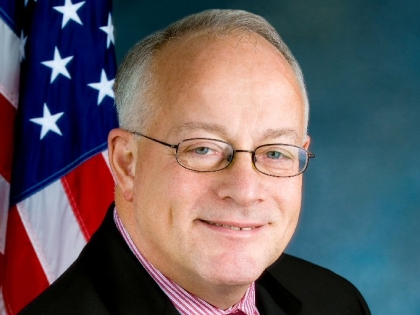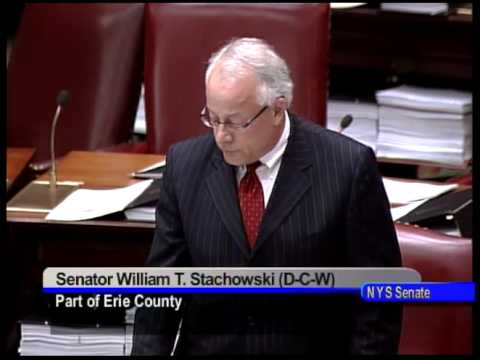
Senator Dale M. Volker Announces Senate Passage Of Medicaid Fraud Measures
(Albany, NY) Senator Dale M. Volker (R-I-C, Depew) today announced that the Senate passed the toughest, most comprehensive plan to combat Medicaid fraud in the United States. The Medicaid Fraud Prevention and Recovery Reform Act of 2006 is a 10-point plan that would fight fraud and abuse at every step of the process, from billing and pre-payment review to investigation, civil recovery and criminal prosecution of Medicaid thieves.
"The goal of the State Senate's Medicaid Fraud package is simple -- saving our taxpayers over $2 billion and continue to provide health care services for those in need," said Senator Dale M. Volker. "For those who continue to exploit our state's Medicaid system, their illegal behavior will be met with severe criminal penalties. We will not tolerate and accept fraud within our Medicaid system, and we are giving our law enforcement agencies the needed legal tools to prosecute those who take advantage of the public’s trust."
The Medicaid Fraud Prevention and Recovery Reform Act of 2006 includes similar reforms enacted in Texas, which provided immediate results. In the first year after enacting Medicaid reform, Texas increased the amount of money recovered from Medicaid fraud by 30 percent, without incurring any additional expense. Texas, now, annually recoups five percent of its total Medicaid expenditures. Applying the results in Texas to New York’s $46 billion Medicaid program, would result in an annual savings of $2.3 billion for the program and provide relief for State and local taxpayers.
The Senate anti-Medicaid fraud plan includes:
Creating a new, independent, Office of Medicaid Inspector General by consolidating responsibilities and staff from eight agencies into one new office within the Department of Health;
Referring fraud cases to local district attorneys if a case is refused by the Medicaid Fraud Control Unit in the Attorney General’s office;
Allowing local governments and district attorney offices to share in Medicaid fraud recoveries if they provide information or evidence of fraud;
Increasing civil and criminal penalties for people who commit Medicaid fraud;
Requiring all health care institutions to implement corporate compliance and internal controls programs;
Requiring the State Insurance Department to submit an annual report of health insurance fraud cases submitted by health plans;
A $500,000 appropriation for the New York Prosecutors Training Institute to conduct an educational program on Medicaid fraud for local district attorneys;
Authorizing the Department of Health to upgrade information technology to detect Medicaid fraud;
A demonstration project in Chemung County using the latest technology to detect Medicaid fraud; and
Adopting a State False Claims Act that would allow the State to collect 10 percent of the federal share of any recoveries made under the Act.
The federal General Accounting Office estimates that 10 percent of Medicaid expenses are diverted through fraud, an amount equal to billions of dollars spent by New York on the program. The comprehensive Senate Medicaid fraud plan was developed after statewide public hearings held by the Senate Medicaid Reform Task Force. At the hearings, the task force received input and suggestions from people in the health care industry and the law enforcement community on what could be done to strengthen the state’s efforts to detect and prevent Medicaid fraud.
The Senate Medicaid Reform Task Force, created in 2003, recommended several important measures that have become law, including the State cap on local Medicaid expenses and the State takeover of the local share of the Family Health Plus program, that have saved local property taxpayers billions of dollars.
Medicaid Fraud Prevention and Recovery Reform Act of 2006
The Medicaid Fraud Prevention and Recovery Reform Act of 2006 is a 10-point plan, including comprehensive legislation (S.6872-A) and a budget appropriation for the New York Prosecutors Training Institute (NYPTI). The plan includes the following:
1. Office of Medicaid Inspector General
The legislation consolidates the Administration’s Medicaid program integrity responsibilities and staff from each of the eight involved state agencies into a new Office of Medicaid Inspector General within the Department of Health. While the Office must remain within the Department of Health to receive federal matching funds and maintain access to the necessary claims information, its operations will be completely independent. The Inspector General would function independently and report directly to the Governor.
The Office will focus on three main functions: compliance, investigation and recoupment/sanctions. To this end, it will review all Medicaid expenditures and investigate those identified as suspected fraud or abuse. It will have the power to withhold payment until the claim is determined to be appropriate (up to 30 days under federal law), impose administrative sanctions and pursue civil recoveries and third-party recoveries, i.e., coordination of benefits with health insurers.
For those fraudulent claims determined to be criminal, the Office will serve as the investigative entity for provider fraud prosecutions initiated by the Attorney General’s Medicaid Fraud Control Unit (MFCU) or, should the MFCU not accept a referral, local district attorneys and recipient fraud prosecutions initiated by the Welfare Inspector General and district attorneys.
2. Access to Information for Local Prosecutions
The MFCU will have 30 days to accept a criminal fraud referral from the Office. If it fails to accept, the Office will be required to refer the case file to the local district attorney.
3. Restoration of the Local Share for Certain Medicaid Fraud Recoveries
If the Office or the Attorney General achieves any restitution or recovery from information or evidence developed by a local county (or its district attorney), the county will receive 15 percent of the non-federal share (general fund) and the district attorney will receive 15 percent of the non-federal share (for investigation/prosecution of Medicaid fraud or other crimes against revenue). If the local district attorney achieves restitution, the county and the district attorneys office will each receive 20 percent of the non-federal share.
4. False Claims Act
The federal Deficit Reduction Act encourages the states to adopt state False Claims Acts mirroring the federal False Claims Act by providing the state with 10 percent of the federal share of any recovery achieved under the Act.
5. Improved Technology
The Senate bill authorizes and directs the Department of Health to contract with vendors for upgraded information technology necessary to detect Medicaid fraud, conduct utilization review and coordinate third-party benefits (health plans). Improved technology would improve accountability in Medicaid expenditures throughout the process and coordinate benefits with health plans to ensure Medicaid is the payor of last resort..
6. New Medicaid Fraud Offenses and Penalties
The Senate bill incorporates the Executive Budget proposals for tougher civil and criminal penalties on people who commit Medicaid fraud, but limits the applicability to Medicaid.
7. Chemung County Demonstration Project
The Senate bill incorporates the Executive Budget’s proposal for the establishment of a local Medicaid fraud demonstration project in Chemung County, which would develop a fraud detection system that uses the latest technology to review inappropriate utilization of services.
8. Health Insurance Fraud Report
The Senate bill requires the State Insurance Department to annually submit a report detailing its investigation of health insurance fraud cases submitted by health plans. Currently, SID is investigating 2.9 percent of all such cases—far below levels for other types of suspected insurance fraud.
9. Corporate Compliance Program
As a prerequisite for Medicaid eligibility, the Senate bill requires larger Medicaid providers to implement Sarbanes-Oxley style corporate compliance and internal controls programs designed to prevent improper and inaccurate billings and fraud.
10. NYPTI Appropriation
The Senate Majority’s Medicaid fraud package includes a $500,000 budget appropriation for NYPTI to conduct an educational program relating to Medicaid fraud for local district attorneys and prepare form materials/basic research.
In addition, the grant will require NYPTI to report to the Legislature regarding the necessity of additional staff in certain district attorneys’ offices to prosecute Medicaid fraud and judicial reforms, such as creating a Medicaid fraud or crimes against revenue division within the State Supreme Court.
1
The bill was sent to the Assembly.
####
